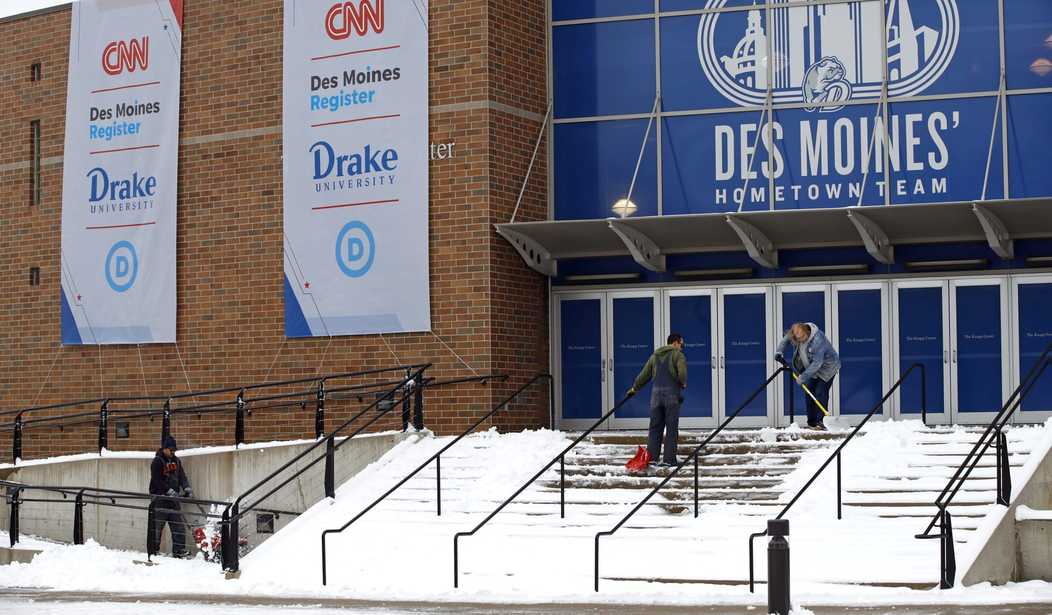Rush Limbaugh dubbed it “Operation Chaos” when he encouraged Republican voters in 2008 to cross parties and vote for Hillary Clinton in the Democratic primaries in order to prolong the Democratic bloodletting between her and rival Barack Obama.
But there’s a new name for it this year: The Iowa caucuses. And the Democrats are making the bloodletting worse all on their own.
So here’s the abbreviated version of how Democrats caucus in Iowa.
After months of getting henpecked over the airwaves and in person by damn near every single one of the Democrats’ 20 or so candidates, Iowans meet tonight at 8 p.m. Eastern in gyms, people’s homes, and libraries in all 99 counties and 1,678 precinct locations. Instead of just casting ballots, they’ll actually caucus: That is, they’ll sit around and talk about it. Because sharing is caring and please kill me now.
Anyone can caucus, but relatively few do. A big year is maybe 15% of eligible voters.
Maybe you’re thinking: “So everyone casts a vote, they’ll tally them up, report in, and then we’ll know the winner.” If only it were so simple.
Each caucus will actually have two rounds of voting. After the first round (at each caucus location, mind you), if a candidate doesn’t get at least 15%, they aren’t considered viable, and their supporters must pick someone else in the second round. Even if your candidate did make the cut, you don’t have to vote for him again in the second round.
So as the numbers filter in tonight, we’ll see three different results:
• The statewide preference after the first vote
• The preference after the second vote
• The final State Delegate Equivalents
Easy, right? Wrong. NPR describes what happens next, and the final results won’t actually be known for more than six weeks:
The caucusgoers from the 1,678 precincts determine 11,402 delegates, who will go to county conventions on March 21.
They are then filtered to a smaller universe of delegates who go to the congressional district conventions on April 25, the state convention on June 13 and then, finally, just 41 delegates who get to go to the national convention July 13-16 in Milwaukee.
To hold onto delegates, campaigns have to try to keep activists and staffers at each of these steps because they are not bound to their candidates, and often the results can be very different from the caucus night results.
If you’re thinking “month-long goat rodeo,” I’m right there with you.
But these are Democrats we’re talking about, so these are monkey wrench-wielding goats. Bloomberg News reported just a few hours ago that the party has moved to using an app to produce tonight’s results, and that there are issues with it:
Precinct chairs across Iowa said that some of them are struggling to use the new phone application for reporting Monday night’s caucus results, potentially delaying the counting of the first votes in the 2020 Democratic race.
The application is one of the ways local officials who oversee individual caucuses are able to send results from each of the nearly 1,700 sites to the Iowa Democratic Party, which compiles and checks the results.
The app was created to improve the efficiency of reporting of results, but chairs unable to use the app on Monday will send their results to the party via a call-in number. The party hotline has always been available to precinct chairs. State party officials said they have no concerns that the results will be counted inaccurately.
Sure. We all know that the party elites would never do anything to rig the results of a primary fight. Except of course that they did just that against Bernie Sanders (Bolshevik, USSR) in 2016, and are apparently doing it again this time around.
In other words, it’s a self-inflicted Operation Chaos.
God bless our new partners at Decision Desk for staying on top of all the madness tonight. I’ll stay on top of my Bombay Sapphire martinis with a twist of lime, and provide you with all the live drunkblog coverage to which you’ve become accustomed.
CORRECTION: There’s been a rules change for 2020, and caucusgoers whose candidate does pass the 15% threshold will not be allowed to change their vote in the second round. So by my math, tonight’s caucuses will be 8% less chaostastic.
Thanks to Susan Speakman for the heads up on that.










Join the conversation as a VIP Member